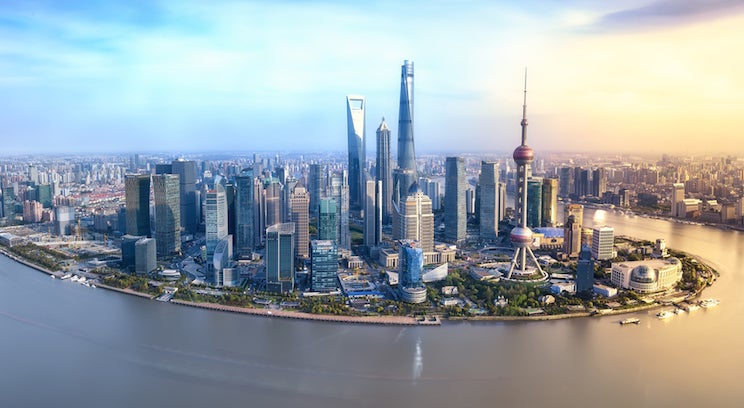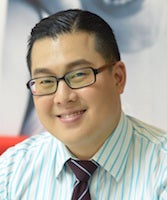
When Eric Wu, Asia Pacific M&A regional counsel and head of legal for the Asia Pacific Innovation Center at Johnson & Johnson, was a child, he wanted to be a doctor. Growing up in Taipei, Taiwan in the '80s and '90s, he remembers when medical care had just started to show significant development in the country. Wu remembers his childhood doctor that regularly treated his severe asthma. “It felt like he knew magic,” Wu recalls fondly.
While he ultimately pursued a career in corporate law, Wu has made it his mission to help facilitate the development of treatments for unmet medical needs and the advancement for access to healthcare around the world. At Johnson & Johnson, he hopes to play a role in bringing Asia to the forefront in the healthcare industry as a center of innovation, and assist the company’s vision of someday eliminating disease as we currently know it.

Eric Wu
“When I rediscovered my passion for healthcare, I realized I was too old to try and become a doctor. But I figured, if I could be a part of something that helped patients in need, particularly in underserved areas in Asia Pacific and other parts of the world, then I will have done something good in this life,” he explains.
Born in New York, Wu moved to Taipei as a child when Taiwan was becoming a rising economic power in the region. His grandfather was the country’s vice minister of economic affairs, and gained international notoriety for bolstering the Taiwanese position in the global market.
Surrounded by politics and humanitarianism, Wu quickly became inspired to instill change in the world around him. In one notable instance in middle school, he remembers trying to make an impact by leading his classmates in organizing events to raise money and awareness for HIV when little was known about the disease.
“I thought: ‘Maybe this random kid from Taiwan with a multicultural background could make a difference,’” he remembers.
Wu completed his undergraduate degree at Georgetown University, where he studied international politics and law. While in college, his father was tragically diagnosed with end-stage colorectal cancer, and passed away shortly before he entered law school at the Boston University School of Law. The experience motivated Wu to complete his studies, and served as a crucial reminder of his passion for healthcare.
“I wanted to pursue the career we had talked about, and then someday come back to Asia and make a difference,” he explains.
The opportunity would come in 2008, when law firm Skadden, Arps, Slate, Meagher & Flom LLP & Affiliates offered him a position to help spearhead their Shanghai office as an associate.
“I had a distinct advantage because I had a deep understanding of both the East and the West. So, when companies were looking to invest or expand in Asia, I found myself well-positioned to help in those endeavors,” he states.
Still, Wu yearned to find a nexus with healthcare. That’s when he accepted a position at Ropes & Gray LLP in its life sciences group to help start up their first office in China. As luck would have it, Johnson & Johnson was one of their primary clients.
“Ropes & Gray was very supportive of my passion — so when Johnson & Johnson offered me a position, it seemed like a perfect fit,” he recalls.
In his current role, Wu is responsible for managing all Johnson & Johnson M&A and Innovation Center activities that touch the Asia Pacific region. From early-stage research collaborations to late-stage acquisitions, he is called upon to help the company navigate, jurisdiction-by-jurisdiction, one of the fastest growing parts of the world.
“Asia Pacific is continuing to evolve as many countries in the region are entering the global market as potential sources of innovation. We have one of the largest percentages of highly educated people in the world and, as a result, we’re seeing great strides in new ideas being materialized,” he explains. “However, with innovation and development in the Asia Pacific comes regulation, so we expend tremendous efforts to keep up with the pace, if not be ahead of the curve.”
When faced with a transaction, Wu plays a leading role in advising the company on the relevant requirements on a local, regional, and global scale. Suppose that Johnson & Johnson is pursuing an expansive M&A transaction in Japan with some footprint in China, the United States, and other jurisdictions. In such an instance, Wu must work with law department team members around the globe to ensure that each portion of the deal is compliant under the standard of the jurisdiction it pertains to. As a result, what was once one large deal turns into multiple deals that must be handled under the same umbrella.
“We have multi-day closings and work as a unified global team to address cross-regional considerations,” he notes. “For example, you may close Japan first, and then more local jurisdictions on a rolling basis. You’re oftentimes doing dozens of mini M&A transactions under one main project.”
In working with both large and small companies throughout this process, Wu underscores the importance of having a team that extends well beyond the scope of the legal department. “We’re committed to what we do. One thing I love about our company is that employees at Johnson & Johnson want to do the right thing. And if that’s your starting point, you have more trust in your colleagues to act ethically,” Wu states.
Employees at Johnson & Johnson are guided by a 75-year-old document referred to as “Our Credo”: a guiding set of principles that govern employee decision-making and drives its core business. Above all, the credo maintains that in addition to its stockholders, the company is responsible for its customers, its employees, and for the global communities working toward advancements in the healthcare industry. The form in which Johnson & Johnson sets out its credo makes it clear that ethics are not contingent upon annual revenue.
“It’s one of the things that drew me to the company,” says Wu. “I couldn’t believe how many people not only understood these values, but actively sought to advance them.”
With employees in over 60 countries, Wu feels comforted to know that ethics are ingrained into Johnson & Johnson culture. At any given moment, he can reach out to the most senior member of the regulatory group and not feel intimidated. “It’s a team mentality,” Wu exclaims. “By helping one another, we ultimately provide better services to our customers and to those in need.”
This past year, Johnson & Johnson allocated over nine billion dollars to research and develop more effective and innovative ways to help address patients’ unmet needs. In addition to its research and development efforts, the company has provided access to HIV therapy to thousands of patients living in underserved areas and donated one billion doses of VERMOX®, a chewable gastrointestinal drug, to those impacted by parasitic infections in developing countries. Wu emphasizes that he is immensely proud of Johnson & Johnson’s efforts.
“It’s projects like these that get me excited about the work that we do. It brings me back to why I wanted to work in healthcare in the first place,” he says.
By 2030, Johnson & Johnson envisions a world without disease, and Wu stands ready to help in that crusade. Through the development of pre- and post-symptom treatments, along with more effective ways to diagnose and intercept diseases, the company hopes to break down barriers and identify new ways to prevent, control, and eliminate illness. While Wu concedes that this is a lofty proposition, he underscores Johnson & Johnson’s commitment to making it happen.
“The law department is proud to support this vision and is ready to work tirelessly to get us there. We’re all-in,” he exclaims.
Reminiscing about his time as a child in Taiwan, with dreams of becoming a doctor, Wu knows that he has used his legal expertise to help make the world a healthier place. If he can facilitate this objective — through even the smallest transaction — he will continue to feel that he’s on the right path.
“Five years down the road, I just hope that I’ve done something in the region, or around the world, to help patients who need it,” Wu reflects.
Getting to know... Eric Wu
Do you have any hobbies? What do you do in your spare time?
I like challenging myself by going on adventures. I’m not particularly athletic, but my wife and I have made a point to take advantage of our time on this earth to explore as much of it as possible. We’ve done some fun things like spelunking to explore unmapped caves, jungle hiking to explore rarely seen waterfalls, and deep water diving off of remote islands. One of my favorite “adventuring” memories is proposing to my wife at the Hanakapi’ai Falls after an all-day hike across the Kalalau Trail in Kauai — my wife had no idea why I was so insistent on getting to the falls. It was such a fun experience.
Where are you going for your next vacation?
We’re going to Thailand to spend New Year’s Eve and my birthday with some close friends. Good family and friends are one of the keys to health and happiness.
If you could have dinner with anyone living or dead, who would it be?
Stan Lee, the godfather of comics. When I was growing up in Taiwan and learning English, comic books played a very large role in keeping me engaged with learning the English language and helping me understand some American culture. I never expected comic books would be as big as they are today and Stan Lee has been at the forefront since the beginning. I’ve always admired him.




